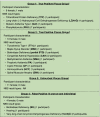Pain points in parents' interactions with newborn screening systems: a qualitative study
- PMID: 35361157
- PMCID: PMC8967687
- DOI: 10.1186/s12887-022-03160-1
Pain points in parents' interactions with newborn screening systems: a qualitative study
Abstract
Background & objectives: This study aims to explore and elucidate parents' experience of newborn screening [NBS], with the overarching goal of identifying desiderata for the development of informatics-based educational and health management resources.
Methods: We conducted four focus groups and four one-on-one qualitative interviews with a total of 35 participants between March and September 2020. Participants were grouped into three types: parents who had received true positive newborn screening results; parents who had received false positive results; and soon-to-be parents who had no direct experience of the screening process. Interview data were subjected to analysis using an inductive, constant comparison approach.
Results: Results are divided into five sections: (1) experiences related to the process of receiving NBS results and prior knowledge of the NBS program; (2) approaches to the management of a child's medical data; (3) sources of additional informational and emotional support; (4) barriers faced by parents navigating the health system; and (5) recommendations and suggestions for new parents experiencing the NBS process.
Conclusion: Our analysis revealed a wide range of experiences of, and attitudes towards the newborn screening program and the wider newborn screening system. While parents' view of the screening process was - on the whole - positive, some participants reported experiencing substantial frustration, particularly related to how results are initially communicated and difficulties in accessing reliable, timely information. This frustration with current information management and education resources indicates a role for informatics-based approaches in addressing parents' information needs.
© 2022. The Author(s).
Conflict of interest statement
The authors have no conflicts of interest relevant to this article to disclose.
Figures
Similar articles
-
Psychosocial risk associated with newborn screening for cystic fibrosis: parents' experience while awaiting the sweat-test appointment.Pediatrics. 2005 Jun;115(6):1692-703. doi: 10.1542/peds.2004-0275. Pediatrics. 2005. PMID: 15930234
-
Communication of carrier status information following universal newborn screening for sickle cell disorders and cystic fibrosis: qualitative study of experience and practice.Health Technol Assess. 2009 Nov;13(57):1-82, iii. doi: 10.3310/hta13570. Health Technol Assess. 2009. PMID: 19948087
-
A qualitative assessment of parental experiences with false-positive newborn screening for Krabbe disease.J Genet Couns. 2022 Feb;31(1):252-260. doi: 10.1002/jgc4.1480. Epub 2021 Jul 15. J Genet Couns. 2022. PMID: 34265137
-
Parents' and informal caregivers' views and experiences of communication about routine childhood vaccination: a synthesis of qualitative evidence.Cochrane Database Syst Rev. 2017 Feb 7;2(2):CD011787. doi: 10.1002/14651858.CD011787.pub2. Cochrane Database Syst Rev. 2017. PMID: 28169420 Free PMC article. Review.
-
Parents' Experiences of Their Child's Disclosure of Child Sexual Abuse.Fam Process. 2020 Dec;59(4):1773-1788. doi: 10.1111/famp.12507. Epub 2019 Nov 12. Fam Process. 2020. PMID: 31715020 Review.
Cited by
-
Diagnostic experiences of Duchenne families and their preferences for newborn screening: A mixed-methods study.Am J Med Genet C Semin Med Genet. 2022 Jun;190(2):169-177. doi: 10.1002/ajmg.c.31992. Epub 2022 Aug 9. Am J Med Genet C Semin Med Genet. 2022. PMID: 35943031 Free PMC article.
-
[Analysis of online parenting community posts on expanded newborn screening for metabolic disorders using topic modeling: a quantitative content analysis].Korean J Women Health Nurs. 2023 Mar;29(1):20-31. doi: 10.4069/kjwhn.2023.02.21. Epub 2023 Mar 31. Korean J Women Health Nurs. 2023. PMID: 37037448 Free PMC article. Korean.
-
Current Status of Newborn Bloodspot Screening Worldwide 2024: A Comprehensive Review of Recent Activities (2020-2023).Int J Neonatal Screen. 2024 May 23;10(2):38. doi: 10.3390/ijns10020038. Int J Neonatal Screen. 2024. PMID: 38920845 Free PMC article. Review.
-
Psychosocial issues and coping strategies in families affected by long-chain fatty acid oxidation disorders.JIMD Rep. 2023 Dec 5;65(1):25-38. doi: 10.1002/jmd2.12402. eCollection 2024 Jan. JIMD Rep. 2023. PMID: 38186849 Free PMC article.
-
Insurance Reimbursement for Special Foods and Phenylalanine Levels in Patients With PKU in China.JAMA Netw Open. 2024 Jun 3;7(6):e2412886. doi: 10.1001/jamanetworkopen.2024.12886. JAMA Netw Open. 2024. PMID: 38837161 Free PMC article.
References
-
- Fabie NAV, Pappas KB, Feldman GL. The current state of newborn screening in the United States. Pediatr Clin N Am. 2019;66:369–386. - PubMed
-
- Berry SA. Newborn screening. Clin Perinatol. 2015;42:441–453. - PubMed
-
- Clinical and Laboratory Standards Institute . NBSo2-A2: newborn screening follow-up; approved guideline. 2. Clinical; Laboratory Standards Institute; 2013.
Publication types
MeSH terms
Grants and funding
LinkOut - more resources
Full Text Sources
Medical
Research Materials
Miscellaneous


